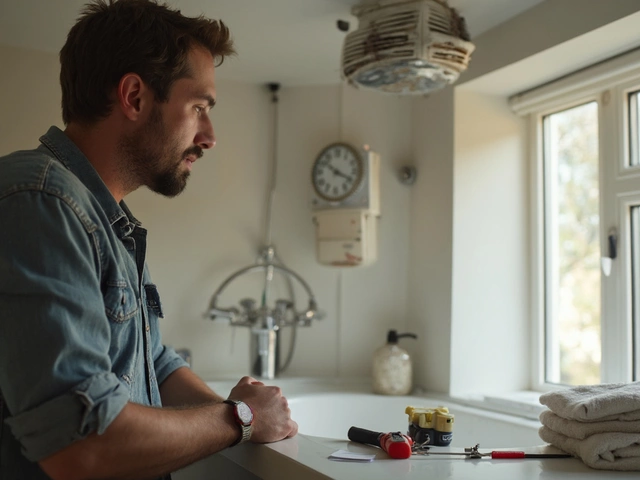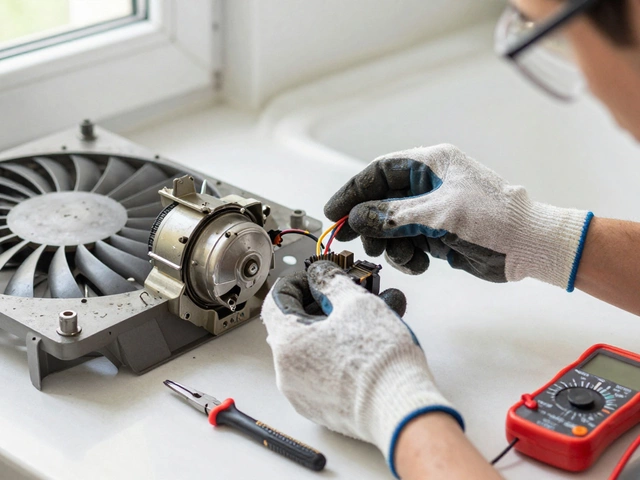Tinkering with a boiler might seem like a money-saver, but one small mistake can mean no heating, a busted boiler, or even serious danger. Most people don't realize that even a quick inspection or tightening a screw can get risky fast if you don't know what you're looking at.
Some boiler jobs are okay for homeowners—like checking the pressure or cleaning the exterior—but things get dicey if you start touching the inside. Gas leaks, carbon monoxide, and fire hazards are very real. In the UK, for example, only Gas Safe registered engineers are allowed to open up and service gas boilers. Break the rules, and you're on the hook if anything goes wrong.
But you don't have to stay in the dark. You can do simple checks, spot early warning signs, and prevent bigger issues by knowing what to watch for. Stick with the basics, and don’t try to play expert unless you actually are—your boiler, your safety, and your wallet will thank you.
- Boiler Service: What’s Really Involved?
- DIY Tasks: What You Can Safely Do
- When You Should Never DIY
- The Legal Side: What the Law Says
- Smart Maintenance Tips and Tricks
Boiler Service: What’s Really Involved?
People hear “boiler service” and picture someone poking around with a wrench for twenty minutes, but there’s a method to the madness. A proper boiler service means going way deeper than just a quick look-over. Most certified engineers follow a step-by-step checklist that covers safety, efficiency, and legal standards.
Here's what a typical boiler service actually involves:
- Visual Checks: The engineer looks for leaks, corrosion, or any odd noises. Out-of-place stains or smells can also mean trouble brewing somewhere inside.
- Main Components Inspection: This includes taking off the boiler case to safely check things like the heat exchanger, burner, main injector, and spark probe. Any grime build-up gets taken care of, which helps keep efficiency up.
- Gas and Pressure Tests: They measure gas pressure and flow to make sure everything meets the manufacturer's guidelines and legal safety limits.
- Flue Check: The flue pipes get checked for any blockages or leaks that could let out carbon monoxide—a silent killer.
- Controls and Sensors: Thermostats, safety devices, and controls are tested to make sure the boiler reacts right if something goes wrong.
Here's a quick rundown of key data on what a routine service checks and how often it usually takes:
| Service Step | How Often | Why It Matters |
|---|---|---|
| Visual Inspection | Yearly | Catches leaks, corrosion, early warning signs |
| Gas Pressure Test | Yearly | Stops dangerous gas leaks, avoids breakdowns |
| Internal Component Cleaning | Yearly | Keeps efficiency up, extends boiler life |
| Flue & Emissions Check | Yearly | Prevents carbon monoxide leaks |
| Controls & Safety Test | Yearly | Assures safety shutdown features work |
Don’t ignore annual servicing. Around 60% of boiler breakdowns are caused by skipped maintenance, according to British Gas. That small upfront check-up can keep surprises at bay and help your boiler last its full lifespan—usually about 10-15 years if you take care of it.
DIY Tasks: What You Can Safely Do
If you’re looking to take care of your boiler service at home, you need to know exactly where to draw the line. Messing around with internal parts, gas, or electrics is always off-limits. But there are some things you can do yourself to keep your boiler running better and lower your risk of breakdowns.
- Check the Pressure: Your boiler needs good pressure (usually between 1 and 2 bars) to work right. Most boilers have a pressure gauge on the front—if it drops too low, follow the manual’s instructions to top it up. Don’t over-pressurize, or you could cause leaks.
- Bleed Your Radiators: If your radiators are cold at the top but warm at the bottom, it’s probably trapped air. Grab a radiator key, turn slightly until you hear air hiss, and close it when water starts coming out.
- Clear the Area: Make sure nothing is blocking your boiler. Keep clutter, boxes, and towels away to help ventilation and stop dust from building up.
- Inspect for Leaks or Noises: Look under the boiler and check for any wet spots. Listen for strange banging or whistling—a noisy boiler is usually a sign something's off and should be checked by a pro.
- Reset the Boiler: Sudden shut-down? Most modern boilers have a reset button you can press if things go wrong—double-check your manual first just to be sure.
Simple maintenance tasks can make a big difference. According to a 2024 survey by Which?, nearly 20% of boiler breakdowns could have been avoided with regular pressure checks and radiator bleeding.
| DIY Task | Frequency | Average Time |
|---|---|---|
| Check boiler pressure | Every month | 2 minutes |
| Bleed radiators | Every autumn | 5 minutes per radiator |
| Clear area around boiler | Every month | 1 minute |
| Look for leaks/noises | Every month | 3 minutes |
Never open the boiler casing or mess with the gas supply. Anything inside the unit or involving tools should be left to a qualified engineer. If you smell gas or your carbon monoxide alarm goes off, get everyone out fast and call emergency services—don’t try to fix it yourself.

When You Should Never DIY
Not every boiler job is up for grabs. Some stuff is way too risky, illegal, or just plain smart to leave to licensed pros. Most accidents with home boilers happen when people ignore the rules or think YouTube qualifies them for boiler service. Here’s where you absolutely shouldn’t roll up your sleeves.
- Gas or Oil Boiler Repairs: The second you smell gas, spot a leak, or see error codes on the display, back away from the boiler. Messing with gas lines or burner parts is not only illegal if you’re unqualified, but it can cause fires, explosions, or carbon monoxide leaks.
- Internal Cleaning and Part Replacement: Taking off the front, poking around inside, or trying to swap out valves and heat exchangers is off-limits unless you’re qualified. It’s easy to make a small error that leads to major damage or serious injury.
- Electrical Repairs: Combis, system boilers, and even basic home heat systems have electric controls and sensors now. Faulty wiring, blown fuses, or damaged boards? Don’t touch those unless you’re trained.
- Any Job Needing a Gas Safe (UK) or Certified Technician (US): In the UK, you risk prosecution and voiding your insurance if you attempt any gas work and you’re not Gas Safe registered. In the US, licensed or certified HVAC techs are required for most repairs.
Here’s how risky those DIY attempts can get, according to data from the UK Health & Safety Executive and U.S. Consumer Product Safety Commission:
| Type of Incident | Annual UK Cases | Annual US Cases |
|---|---|---|
| Gas-related fires/explosions | ~330 | ~1,600 |
| Carbon monoxide poisoning (from gas appliances) | ~40 deaths | ~400 deaths |
| Serious injury from improper repairs | Hundreds | Thousands |
This isn’t just about following the law; it’s about your life and your family’s safety. If something goes wrong, home insurance may refuse to pay out if you worked on your own boiler. Some manufacturers also require proof of pro servicing to keep the warranty active.
The bottom line: Anything involving gas, wiring, or internal components is out of bounds unless you’re certified. No savings is worth risking your safety—or a massive repair bill down the road.
The Legal Side: What the Law Says
If you’re asking, “Can I service my boiler myself?” the law’s answer is pretty clear—mostly, no. In the UK, only Gas Safe registered engineers can legally carry out work inside a gas boiler. This includes fixing, moving, or even opening internal parts. Doing it yourself isn’t just risky; it’s breaking the law. That rule covers homes, rentals, workplaces, anywhere there’s a boiler hooked up to gas.
Here’s the deal: the Gas Safety (Installation and Use) Regulations 1998 make it illegal for anyone unregistered to touch gas appliances. Landlords are legally required to get an annual safety check from a registered engineer, and homeowners aren’t off the hook if they DIY and something goes wrong. Insurers usually won’t pay a penny if an accident happens after an amateur repair.
| Country | Can a Non-Registered Person Service a Gas Boiler? | Potential Penalty |
|---|---|---|
| UK | No | Unlimited fine/prison sentence |
| USA (varies by state) | Rarely | Fines, loss of insurance, potential prosecution |
| Australia | No | Fines up to AU$25,000 |
Think electric boilers are a free-for-all? Not really. Messing with electrical circuits can get you in trouble unless you know what you’re doing and, in some countries, you still need a qualified electrician for major repairs.
- If you rent out a property, you must have annual checks and keep safety records for at least two years.
- Gas Safe engineers carry an ID—don’t be afraid to ask for proof before letting anyone work on your boiler.
- Your warranty can get voided if you try fixing things on your own, even if it’s just a minor tweak.
Bottom line: Don’t gamble with boiler service. Unless you’re certified, limit yourself to basic checks like topping up the pressure or resetting the boiler. Let the pros handle the technical stuff—the legal risks just aren’t worth it.

Smart Maintenance Tips and Tricks
If you want your boiler to last longer and work better, there’s a few easy routines you can do yourself. You aren’t trying to replace an engineer—just keeping things ticking until the next professional check-up. Regular attention really does save money over time. Remember, even top-end boiler service can’t undo neglect!
First up, keep the area around your boiler clear. Don’t let coats, boxes, or cleaning gear pile up next to it because that blocks ventilation and makes the boiler overheat. It might sound like common sense, but a lot of breakdowns start with clutter.
Bleeding your radiators every autumn is another smart move. If you feel cold spots, there’s probably air trapped inside. Use a radiator key (cheap from any DIY store), a cloth, and twist the valve carefully. When water starts to dribble out instead of hissing air, close it up. This lets the boiler work properly and helps you heat your home evenly.
Keep an eye on your boiler pressure. Most run best at 1–1.5 bar. If the needle’s too low, your heating will be rubbish; if it’s too high, you risk leaks. Topping up the pressure is usually as simple as opening the filling loop until the gauge hits the right mark, then shutting it off. Always double-check the manual—every model’s a little different.
"Simple checks by homeowners, like keeping the pressure in range and inspecting for leaks, can prevent most non-technical boiler issues from turning into expensive repairs." — Which? Trusted Traders
Want early warning? Here are a few things to check every couple of months:
- Listen for weird noises—banging or whistling means something’s off.
- Look for leaks or water stains under and around the boiler.
- Make sure the pilot light or digital display is steady—flickering spells trouble.
- Test your carbon monoxide alarm regularly.
Scheduling a full professional service once a year is also a must—no shortcuts. Trying to skip that will void your warranty and insurance, as shown in the table below:
| Service Interval | Boiler Lifespan Increase | Average Annual Saving (£) |
|---|---|---|
| Annual | 3–5 years | 100–200 |
| None | — | 0 |
Bottom line: take care of the simple stuff, watch for warning signs, and don’t push your luck. Your boiler—and your wallet—will both last a lot longer.





